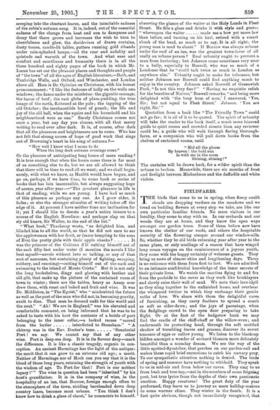" How well I know what I mean to do
When the long dark autumn evenings come."
Or the pleasure of anticipating long hours of mere reading P It is true enough that when the hours come there is for most of us something else to do, but we are all allowed to think that there will be time to read all we want; and we shall begin, surely, with what we know, as Hazlitt would have begun, and go on, perhaps, if we have time, to some book or series of books that has lain inaccessible, but always suggesting hope of access, year after year:—" The greatest pleasure in life is that of reading, while we are young. I have had as much of this pleasure as perhaps any one. As I grow older, it fades ; or else the stronger stimulus of writing takes off the edge of it. At present I have neither time nor inclination for it; yet I should like to devote a year's entire leisure to a course of the English Novelists : and perhaps clap on that sly old knave, Sir Walter, to the end of the list."
"What book," Thackeray wrote, "so delighted him, and ,blinded him to all the world, so that he did not care to see the applewoman with her fruit, or (more tempting to the sons of Eve) the pretty girls with their apple cheeks P It was the prisoner of the Château &If cutting himself out of the sack fifty feet under water (I mention the novels I like best myself—novels without love or talking, or any of that sort of nonsense, but containing plenty of fighting, escaping, robbery, and reseuing)—cutting himself out of the sack and swimming to the island of Monte Cristo." But it is not only the long bookshelves, dingy and glowing with leather and old gilt, that make up the picture of the curtained room of town in winter; there are the tables, heavy as Aesop ever drew them, with roast and baked and fruit and wine. It was Dr. Middleton, in "The Egoist," who " misdoubted the future as well as the past of the man who did not, in becoming gravity, exult to dine. That man he deemed unfit for this world and the next." " Ah ! We are in England," was his elevated and comfortable comment, on being informed that he was to be asked to taste with his host the contents of a bottle of port belonging to the inner cellar,—a locked recess "sacred from the butler interdicted to Stoneham." "A
chirrup was in the Rev. Doctor's tone 'Senatorial Port I we say. We cannot say that of any other wine. Port is deep-sea deep. It is in its flavour deep—mark the difference. It is like a classic tragedy, organic in con- ception. An ancient Hermitage has the light of the antique; the merit that it can grow to an extreme old age ; a merit. Neither of Hermitage nor of Hock can you say that it is the blood of those long years, retaining the strength of youth with the wisdom of age. To Port for that 1 Port is our noblest legacy !" The wine in question had been inherited" by his host's grandfather. It is in the company of wine, in the hospitality of an inn, that Borrow, foreign enough often to the atmosphere of the town, striding bareheaded down deep country lanes, becomes most urbane. "You think I don't know how to drink a glass of claret," he comments to himself,




















































 Previous page
Previous page